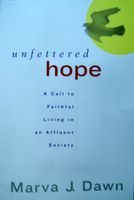
Still thinking about pluralism, relativism and fragmentation I had been searching and listening for ways in which not just within culture, but the church the effects showed themselves and how we could name this and reform’ beyond these means of operating. In on this I came upon ‘Unfettered Hope’ by Marva J. Dawn and already it excites me (I’ve got to end of chapter 2 so far!)
I’ve read several books by Marva J Dawn, but I have to say that ‘Unfettered Hope’ is a marvelous piece of writing that offers a Christian reflective response to the “gigantic bluff” (used by J. Ellul) of the technological postmodern world.
In it she uses the word ‘fettering’ to ‘summarise the many ways that our feelings of hope might be stifled or squashed, that our hopes in the form of a possible event might be prevented or spoiled, that our hope for a condition in the world might be thwarted or restricted, or that our hopes in things or people might be disappointed or dis-illusioned.’ (Intro xii) How true this statement is. I think that this reading begins to help me get under some of what I have been wrestling with in relation to the various presentations of fragmnentation etc we see around us in society, but also in the church. But more of that reflecting later as I engage more with what Marva writes.
I’ve read several books by Marva J Dawn, but I have to say that ‘Unfettered Hope’ is a marvelous piece of writing that offers a Christian reflective response to the “gigantic bluff” (used by J. Ellul) of the technological postmodern world.
In it she uses the word ‘fettering’ to ‘summarise the many ways that our feelings of hope might be stifled or squashed, that our hopes in the form of a possible event might be prevented or spoiled, that our hope for a condition in the world might be thwarted or restricted, or that our hopes in things or people might be disappointed or dis-illusioned.’ (Intro xii) How true this statement is. I think that this reading begins to help me get under some of what I have been wrestling with in relation to the various presentations of fragmnentation etc we see around us in society, but also in the church. But more of that reflecting later as I engage more with what Marva writes.
Of course she wants to give one way of thinking beyond these and that is in the ‘unique and unfettered hope of the Christian faith… that hope in the Triune God gives us the means for dealing with the diverse fetterings in our lives and frees us to be engaged in counteracting the fetterings of violence and injustices in our world.’
As I read on I will share more, but she sets out at the start with David Ford’s(The Shape of Living) and the response process to the world overwhelming us – 3 imperatives, 1:Name it; 2: describe what overwhelms us, 3: attend to the whole shape of living. Dawn will use this as her outline for process in the book.
This is pretinent to us beginning some readings and reflections in the book of Lamentations, beginning last Sunday. We started to explore the relevance of this for us today, we started by considering it as an act of truthfulness. (We will go on and look a Lamentations as an act of impassioned hope, the wish for justice, resistance and tears as the power for newness. [following Kathleen O’Connor]) As an act of truthfulness Lamentations is truthful about the brutality, suffering and tears of exile and fall of Jerusalem. There is no running away, not covering up in niceness it names the reality. Lament engages us with raw reality. We used Bruce Springstein’s ‘My city in ruins” and it’s images of 9/11, and an empty church, empty streets and in the question “tell me how do I begin again?” which moves the song profoundly towards HOPE.
Now with these hands I pray Lord,
Now with these hands I pray for strength Lord
Now with these hands I pray for faith Lord
Now with these hands I pray for love Lord
(Springstein)